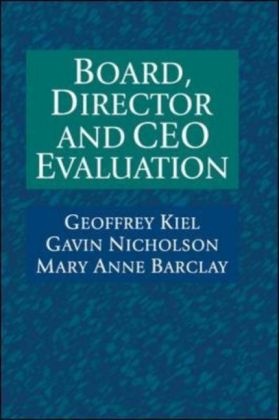Read more
Informationen zum Autor Professor Geoffrey Kiel PhD! AIM! FAICD! FAMI is a management consultant with over twenty years experience and an academic educator and researcher. He teaches on the intensive AICD Diploma program in Brisbane and presents board evaluation seminars in Brisbane and Sydney as well as presenting the Implementing Great Governance program Australia wide. He was Head of the Graduate School of Management at the University of Queensland for twelve years and planning vice-chancellor for the University of Notre Dame Australia. He is currently Professor of Management at the University of Queensland. In addition to his academic standing! he currently provides consulting advice to the Australian based management consultancy! Competitive Dynamics. Klappentext Corporate governance demands an increased focus on the leadership role of the board! the CEO and the directors and the call for these to be more accountable for their own performance is a growing global trend. Board! Director and CEO Evaluation helps to implement the recommendations for evaluation that haven been included in almost every major corporate geovernance review or report. This practical guide is based on the authors' extensive research and consulting experience and provides the information necessary to carry out board! director or CEO evaluations. The authors discuss current thinking in best practice corporate governance and outline the benefits of evaluation. They use diagrams! checklists and practical examples to illustrate key concepts and include questionnaires to evaluate the performance of boards! committees! directors and CEOs. As board! director and CEO performance is critical to today's organisation! this book is an essential business tool. Zusammenfassung Offers a comprehensive and practical approach that enables a tailored evaluation of board! director and CEO performance. Inhaltsverzeichnis 1Introduction1.1Increasing pressure for board evaluations1.2Objections to the board evaluation process1.3Advantages of board evaluation1.4Framework for a board evaluation1.5Conclusion2Setting objectives for your board evaluation2.1What does the board hope to achieve?2.2Getting started2.3First-time evaluations2.4Conclusion3Who will be evaluated?3.1Criteria for deciding who to evaluate3.2Board as a whole3.3Board committees3.4Individual directors3.5Chairperson3.6Lead independent director3.7Company secretary3.8CEO3.9Conclusion4What will be evaluated?4.1The governance balancing act4.2Refining the evaluation's objectives4.3The Corporate Governance Charter framework4.4Applying the framework4.5Other best practice frameworks4.6Conclusion5Who will be asked?5.1Potential sources of information5.2Determining who to ask5.3Conclusion6Evaluation techniques6.1A research methods primer6.2Qualitative analysis6.3Quantitative analysis: the survey6.4Conclusion7Who conducts the evaluation process?7.1Internal reviews7.2External reviews7.3Conclusion8Communicating the results8.1Who will be advised?8.2How and about what will they be informed?8.3Conclusion9Evaluating your CEO9.1Relationship between the board and CEO9.2Pressures for increased CEO evaluation9.3Advantages of the CEO evaluation process9.4Designing a CEO evaluation process9.5Steps in the CEO evaluation process9.6Using the results of the evaluation process9.7Conclusion10Implementation10.1The implementation process10.2The performance evaluation cycle10.3Persuading the board to implement regular evaluation10.4Conclusion11ConclusionAppendix 1Board-as-a-whole questionnaire 1Appendix 2Board-as-a-whole questionnaire 2Appendix 3Individual director self-evaluation questionnaire 1Appendix 4Individual director self-evaluation questionnaire 2Appendix 5Directorial competence self-assessment questionnaireAppendix 6Individual director peer-evaluation questionnaire 1Appendix 7Individual director peer-evaluation questionnaire 2Appen...

